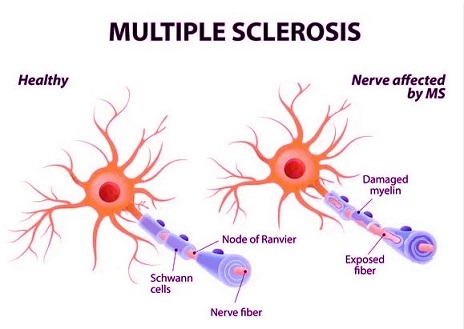High Galactose diet worsens Multiple Sclerosis symptoms by promoting nerve damage
Nikhil Prasad Fact checked by:Thailand Medical News Team Aug 10, 2024 8 months, 2 weeks, 2 days, 2 hours, 36 minutes ago
Medical News: A new study led by researchers from several prestigious German institutions, including the University Hospital Regensburg, University Hospital Erlangen, Ruhr-University Bochum, University of Bonn, and University Medicine Magdeburg, has uncovered alarming evidence that a diet rich in galactose, a common sugar found in dairy products, could significantly worsen the symptoms of neuroinflammatory diseases like multiple sclerosis (MS). This
Medical News report delves into the findings of this important study, highlighting the potential dangers of high galactose intake and its implications for those at risk of or living with MS.
 High Galactose diet worsens Multiple Sclerosis symptoms by promoting nerve damage
Understanding the Study
High Galactose diet worsens Multiple Sclerosis symptoms by promoting nerve damage
Understanding the Study
The study investigated how a galactose-rich diet influences neuroinflammation using a well-established animal model known as Experimental Autoimmune Encephalomyelitis (EAE), which mimics several aspects of MS. Researchers fed young mice a diet high in galactose and observed its effects during both the acute and chronic phases of the disease. The results were striking - mice on the galactose-rich diet showed significantly worse disease symptoms during the peak of inflammation and struggled to recover during the chronic phase. This article discusses how these findings could impact dietary recommendations for individuals with MS.
What Is Galactose
Galactose is a simple sugar commonly found in milk and dairy products. While it is essential for various biological processes, excessive intake has been linked to adverse health outcomes. In this study, the focus was on how galactose might exacerbate neuroinflammation - a critical factor in the progression of MS.
Key Findings of the Study
-Increased Disease Severity: The mice fed a galactose-rich diet exhibited more severe symptoms of EAE compared to those on a normal diet. This was particularly evident during the acute phase, where inflammation is most intense.
-Impaired Recovery: The ability of the mice to recover from the initial inflammatory attack was significantly hampered by the galactose-rich diet, leading to prolonged and more severe neurological damage.
-Neurodegeneration: Despite the diet having no apparent effect on peripheral immune responses, it caused increased damage to the central nervous system (CNS). The study found that galactose consumption led to greater demyelination, which is the loss of the protective sheath around nerve fibers, and increased axonal damage.
-Oligodendrocyte Apoptosis: Oligodendrocytes are the cells responsible for forming and maintaining the myelin sheath. The study revealed that a high galactose diet increased the rate of apoptosis (cell death) among these critical cells, further contributing to the loss of myelin and nerve function.
-Formation of Advanced Glycation End Products (AGEs): The resear
chers also found that galactose led to the formation of AGEs, harmful compounds that are formed when sugars react with proteins or fats in the body. These AGEs were found to accumulate in the spinal cord and were linked to increased cell death in both neurons and oligodendrocytes.
Why This Matters
The findings of this study are particularly concerning because they suggest that galactose, a sugar that many people consume daily through dairy products, could potentially worsen the course of MS. This could have significant implications for dietary recommendations for MS patients and those at risk of developing the disease. The study’s insights into the role of AGEs in neurodegeneration could also open new avenues for research into treatments and preventive strategies for MS and other neurodegenerative diseases.
Conclusions and Future Directions
In conclusion, this study provides compelling evidence that a diet high in galactose can worsen the symptoms of neuroinflammatory diseases like MS by promoting neurodegeneration through the formation of AGEs. These findings highlight the need for further research into the impact of dietary sugars on neuroinflammatory diseases and suggest that individuals with MS or at risk of developing the disease may benefit from reducing their intake of galactose-rich foods.
The study findings were published in the peer-reviewed journal: Frontiers in Immunology.
https://www.frontiersin.org/journals/immunology/articles/10.3389/fimmu.2024.1367819/full
For the latest on Multiple Sclerosis, keep on logging to Thailand
Medical News.
Read Also:
https://www.thailandmedical.news/news/covid-19-news-medical-researchers-from-kunming-china-warn-that-covid-19-can-trigger-tumefactive-demyelinating-lesions-in-multiple-sclerosis-patients
https://www.thailandmedical.news/news/covid-19-news-chronic-neuroinflammation-and-the-enigma-of-brain-fade-syndrome-in-neurological-diseases
